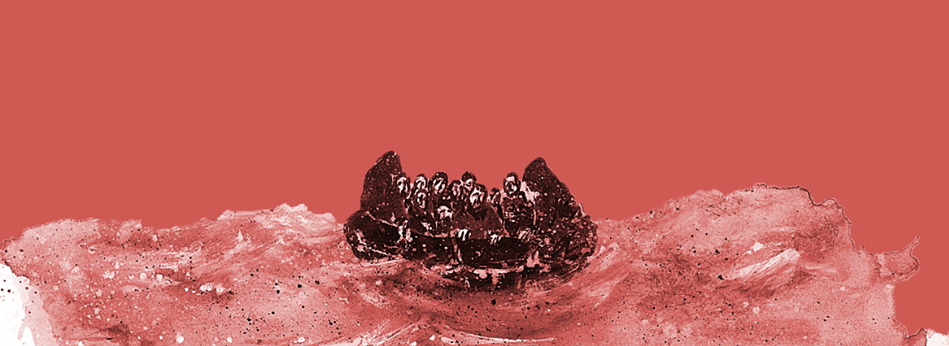ελληνικά | العربية | english | فارسی | français
italiano | castellano | deutsch | türkçe
prologue
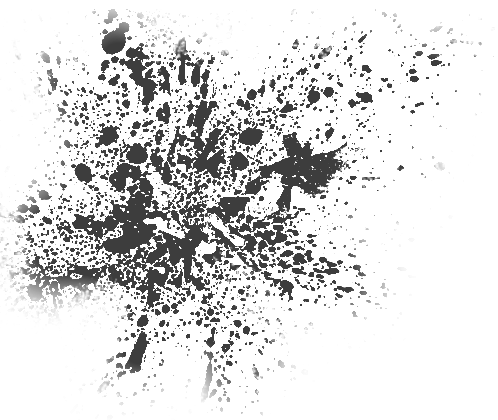
This little book was spontaneously written one afternoon of July 2016, during the days that police forces violently evicted the housing squats of Orphanotrofio, Karolou Dhill and Nikis in Thessaloniki. Since then, some things may have changed. But closed borders, military control of the movement, concentration camps, violent interventions of all kinds by cops and fascists in places where migrants live as well as the efforts for their moral and physical annihilation remain in the daily agenda.
This is a somewhat different attempt to communicate the way in which we understand the “refugee crisis” as part of the ever growing geopolitical and economic rivalries at global and local level and the state-capitalist barbarism as expressed both in the wars raging in the Middle East and Africa and in the Europe of crisis, the fortress-Europe.
Recognizing in the struggles of migrants for decent living and freedom of movement parts of our own struggles against security-regimes, fascism, economic and social strangulation, the need to stand next to people trying to oppose this modern totalitarianism was evident for us. The language in this story may be for children, but the content remains utterly hard and true. No need for complicated words to describe what is so obvious. Even a small child can understand by looking around the size of the disaster that whole populations have suffered, left with only one way to escape, the way of migration.
Some people might find this tale as a “beautification” of the relations that have emerged between all those taking part, or the movement of solidarity in general. It is clear that the way people exist together is more complicated. Individual differences, disagreements and contradictions are also part of a diverse action, inevitable but also desirable part of our common struggles. And that was what we decided to keep in this story, a story that is not newly started (as is schematically said in the text) and certainly will not end any time soon. Even in the darkest tales a trickle of hope faintly gleams keeping us strong and motivating us to continue.
The printed version of the book has been translated in five languages: Arabic, Farsi, Greek, English and French. Our aim was to interweave the languages in the same way we would like our cultures to interrelate. But the different way that Arabic and Farsi languages are being read (starting reading from what Westerners call back cover) combined with our financial constraints made us separate them into two different books. In the web version you can also find the story translated in other several languages.
A big thank you to Kostas M. for the wonderful illustrations that gave life to this little story.
1

One hot summer, not so long ago, and though for some time things were not going so well on planet earth, the situation for many people in different countries of the world took an ugly turn…In some of these, war broke out and bombs started falling like rain, whilst others were stricken by poverty and famine: No more could anyone find anything to eat, not even a plate of food!
2

Everyone was so scared and desperate that they took the decision to run as fast as possible to safety. They took whatever was left of their belongings and started walking. They crossed deserts and seas, climbed walls and travelled in rotten boats. And some of them did not make it…
3
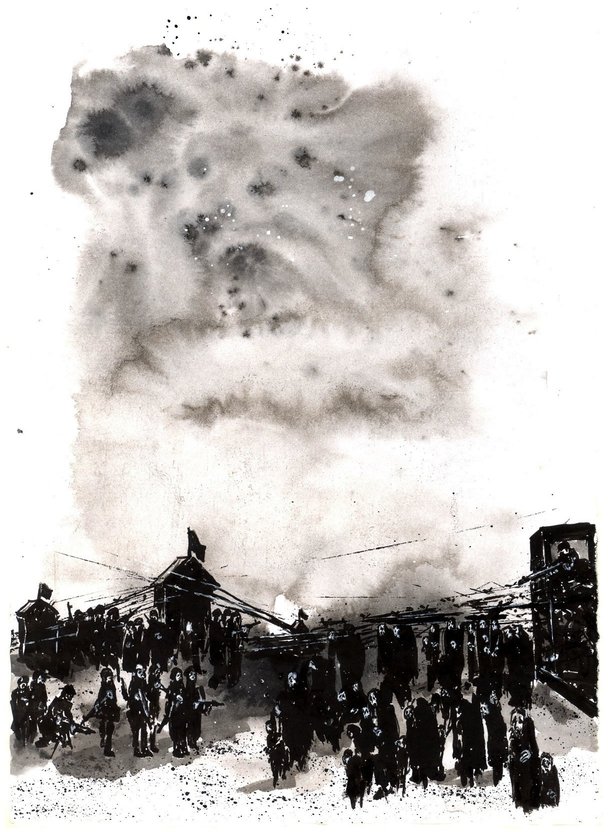
When they finally managed to reach the first country they had been told was safe, they were faced with yet another disaster. Men with Guns blocked their passage and would not let them continue their journey in search of their friends and relatives who were waiting for them further ahead…In fact, they wanted to send them back, back to the bombs and to the poverty they had escaped from!
4

The People from Faraway were very disappointed and angry. They tried to convince the Men with Guns to let them pass. Thousands of them sat in the middle of the blocked passage for months, under the rain, in the snow and under the burning sun. They begged, they cried, they shouted. They asked for help from the People with the Medicines who worked there giving out food, clothes and aspirins, but they said to them that it would be better if they did what the Men with Guns told them. They were trapped!
5
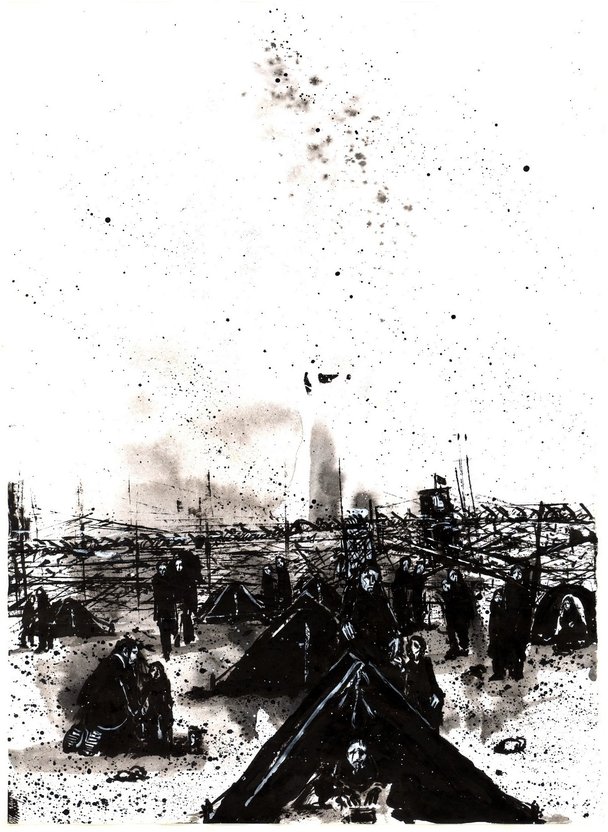
To make things worse, they were ordered to go live in some big military camps. In those camps there wasn’t enough space for them to live, they slept on the ground and it was either very cold or very hot. There were no medicines when they got sick and the food was even less than the food they had in their own countries. But worse of all was that the camps were so distant that one had to walk almost an entire day to meet others! And even if you did that, the Men with Guns would find you and would take you back. Some of these camps were very isolated, like prisons, surrounded by fences so that the Men with Guns would not have to bother returning to the camps, the People from Faraway, every now and then.
Whoever escaped found refuge in the big cities.
6
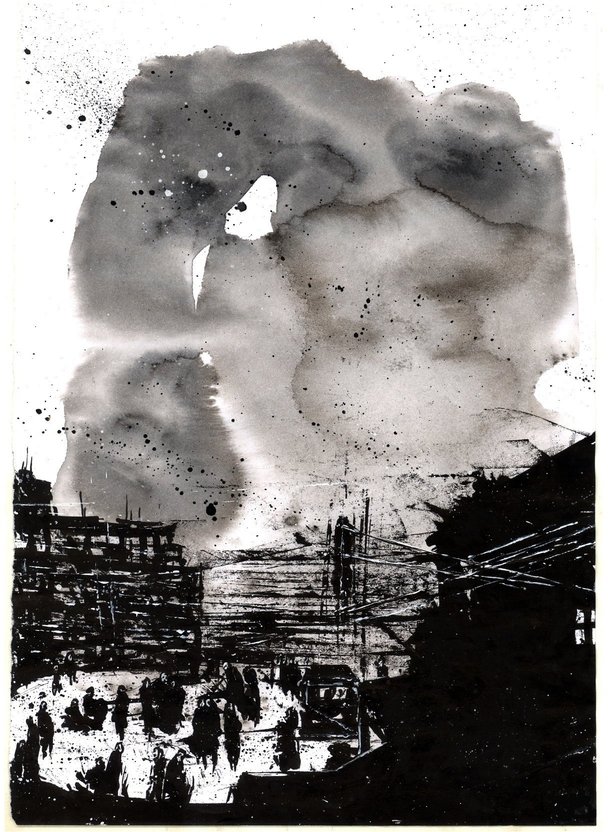
Μeanwhile in the cities, and elsewhere, there were people who did not agree at all with what was happening. Those people lived there for a long time, some of them forever and others just from a while back, but they did not care much about who came first or second to the cities. They could not stand seeing the People from Faraway out in the streets hungry or trapped in camps.
7

They were angry too, not only with the Men with Guns but mostly with their masters. The masters of the Men with Guns were the Men in Suits and their followers. The people who lived in the cities suspected that it was their fault, not only for the blocked passages but also for the military camps, for the bombs and the poverty, which was how this whole story started in the first place. The Men in Suits were also responsible for the poverty of the people from the city. Because in this country, things were not going so well either. If you did not wear a suit or were not their follower, you had to work the whole day and even that wasn’t good enough in order for you to have food on your table or clothes to keep you warm. The Men in Suits wanted to own everything and did not share anything with anyone.
8
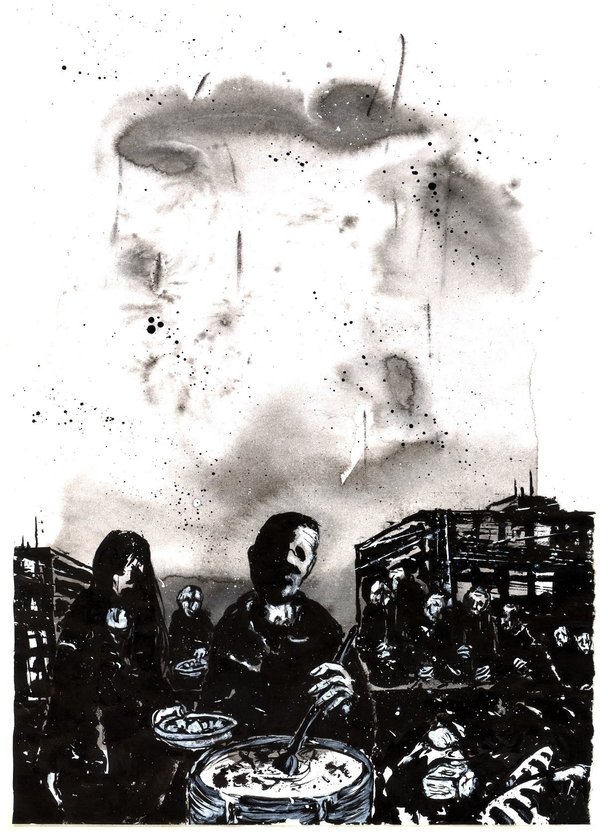
So when they saw the People from Faraway trying to run away from the camps, they understood. They immediately came to their help: they collected clothes to keep them warm and medicines to cure them. They collected as much food as they could and started cooking altogether to satisfy their hunger.
9
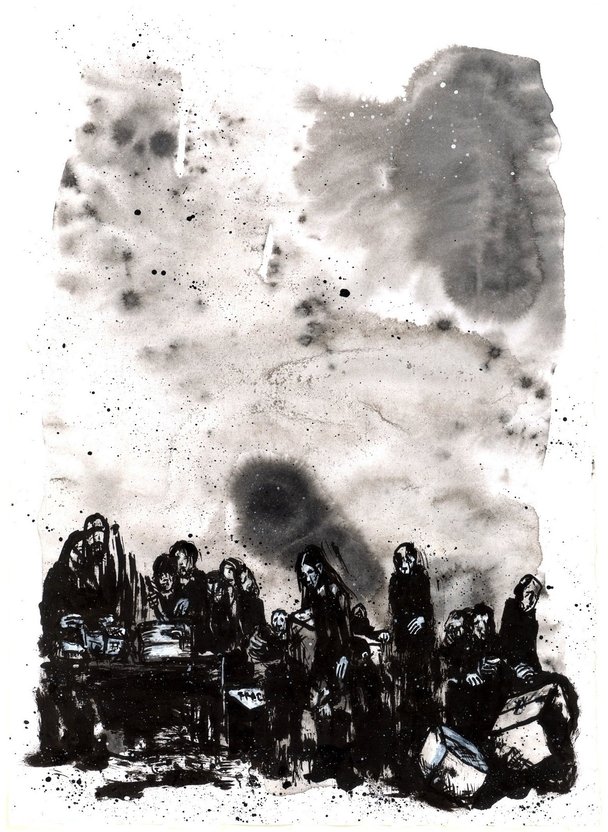
It wasn’t easy. It looked like the tower of Babel! Everyone spoke different languages, everyone had different habits and many times it was difficult for them all to agree on things. It was hard to overcome all the obstacles. But they didn’t stop trying.
10

When many of them gathered up they decided on one thing: the People from Faraway could not live on the streets anymore, and of course, not in the camps! So without much thinking they moved into the first empty house.
In every neighborhood there were a lot of empty houses. Those houses belonged to the Men in Suits or to their friends, and they stayed empty and deserted until someone with enough money would buy them. If no one was ever found with enough money, the Men in Suits preferred to tear them down rather than to let someone in need live in them. That was not very fair.
11

After moving into the first empty house they moved into the second, and then the third and then into tens of empty houses. More and more people could then leave the camps and go live in the city where they would find friends and food. The people who helped the People from Faraway move into the empty houses thought that since their lives were also so very difficult it would be a good idea for them to live there too.
12

The Men in Suits were concerned. In the beginning they weren’t doing anything, mostly because they had not gotten around building enough camps that would fit all the People from Faraway. It was annoying, as they passed by in their luxurious cars, to see the People from Faraway sleep on the city streets. But then the situation became alarming. After all, the Men in Suits were few and the others many. As more and more people moved together into the empty houses soon it would be difficult to stop them. Who knew what else was on their mind! This situation had to stop!
13

In the beginning the Men in Suits told everyone (meaning mainly on TV), that the People from Faraway had no reason to leave the camps, because the food there was good, the air was fresh and the people working for them, the People with the Medicines, took great care of them all. They then tried to spread division. They said that the People from Faraway were mean, violent and that they would spread diseases to the people that were there from before. When that didn’t work, they said that the newcomers would take (the not so well paid, of course) jobs of the others, and that the others that had been there from before would start starving for good. Some, who believed all that, began mistreating the People from Faraway. They, themselves, turned mean and violent. But that did not stop the rest from being united, moving into the empty houses and cooking together. So in the end, the Men in Suits decided to do what they knew best: they called in the Men with Guns.
14

And that’s how it happened. They went into some of the houses and they threw the people out. The old and the new. They send some in front of a judge and others back to the camps. The Men in Suits were actually so scared that the people would go back to the empty houses, that in order to be sure that didn’t happen, they tore one down completely (to be precise, the Men in Suits did not do that but actually some Men in Cassocks, but that’s another story!).
15

Great sadness fell amongst the people… And anger… not only for the houses, but also for the camps, the blocked passages, the bombs and the poverty. But this time The People from Faraway were not alone. They were together with the people that were there from before, and more. More people had come from different countries to help them, because all this was more than unfair! And that’s why there were troubles in the streets.
in the squares…
16

And in front of the churches…
17

And in front of the Men with Guns…
18

Little Ali is sitting under a tree, on the side of the road. It is summer, and most of the people in the city are gone. No one knows why but they say it is usual that this happens at this time of the year. In the small square nearby he can hear beating drums. All those remaining in the neighborhood are frantically jumping to the rhythm. They are drinking beer and dancing like there is no tomorrow. The music, the voices, the laughs and the heat remind Ali, though now unclearly, of pictures from his home. Before the war.
19

Next to him he hears a group of people discussing. The words are scattered amongst the sounds of the drums and the voices…
“They will never let us leave”… “They will never let us live”… “Not even here”…. “We will always find the Men with Guns in front of us”… “The Men in Suits” …. “We have to remain united, we can’t stop”… “We have to move into the empty buildings again”…. “We have to wait” … “We have to do something”… “We have nothing”… “We have nothing to lose”…
20

Ali is sure he has now nothing left to lose. He jumps up and runs towards the drums. He doesn’t want to hear any more nor do anymore thinking. He just wants to dance. He starts dancing and jumping around forgetting, for a short while, everything. He spins and twirls and sings to the rhythm.
21

The only burden he carries is the thought that tomorrow the Men with Guns might come again…
…and a rock in his back pocket just in case…
22

This story hasn’t come to its end…
about
The main purpose of the Tabboush collective is to publish this book written in Arabic and Farsi in as many copies as possible. This way it will be possible to give even more books for free to migrants with whom we either live together in the cities or are detained in camps. Given that the expenses for publishing the books are covered exclusively by the financial support of solidarity groups and individuals, any contribution that we receive from the English-Greek-French edition of the book, will help us publish more books for our bilingual (Farsi-Arabic) edition.
This book was created by Tabboush collective together with: Samis, Christina, Irini, Cybele, Ihab, Ilectra, Bashar, Ioanna, Sina M., Tatiana, Shirzad, Viki , Ntina, Elena and more.
Tabboush
A cat from Faraway
For some people, four-legged comrades do not differ from those with two legs. Tabboush is a cat. He traveled along with the family who hosted him in their house in Syria through Turkey and Greece. He managed to reach the borders at Eidomeni where he stayed for many months. From there, after many adventures he eventually arrived in Sweden. We feel great respect for those who, risking their own survival, didn’t think for a moment the possibility to leave behind their four-legged friends crossing deserts, mountains, seas and ironbound borders along with their dogs or cats. Companionship and the principle of equality do not exclude any kind of life and do not consider differences, nationalities, colors and sexes. Tabboush and his friends eventually managed to settle in Europe. They are the “lucky ones” who have escaped – all together – at least from the war, since so many others have failed. Another kind of war is waiting for them now …
copyleft
The creators of this book feel hostile towards (printed or web) mass media publications, all types of commercial publications and anyone who reproduces part or whole of this book apart from the radical movement. For this reason this edition is protected by the Creative Commons Attribution-NonCommercial-ShareAlike 4.0 International License.
contact
email: tabboush@espiv.net
